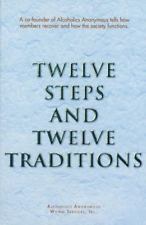
"A.A., as such, ought never be organized; but we may create service boards or committees directly responsible to those they serve."

 |
Tradition Nine "A.A., as such, ought never be organized; but we may create service boards or committees directly responsible to those they serve." |
 |
Today, we are able to say with assurance that Alcoholics Anonymous—A.A. as a whole—should never be organized at all. Then, in seeming contradiction, we proceed to create special service boards and committees which in themselves are organized. How, then, can we have an unorganized movement which can and does create a ser- vice organization for itself? (Page 172)Every other organization, nation, church, political party, etc, has membership requirements, ability to enforce rules and regulations and to expel members, among other types of authority. Alcoholics Anonymous is an exception to this pattern. Perhaps the strongest statement in the literature on the subject of power within A.A. follows: "Neither its General Service Conference, its [General Service] Board, nor the humblest group committee can issue a single directive to an A.A. member and make it stick, let alone mete out any punishment." (Page 173) A.A.'s headquarters in New York can only make suggestions, not give orders. Obedience to spiritual principles is enforced, not by A.A. authority, but by the disease of alcoholism. Survival of the A.A. group as well as the individual depends on such observance. "So we of A.A. do obey spiritual principles, first because we must, and ultimately because we love the kind of life such obedience brings. Great suffering and great love are A.A.’s disciplinarians; we need no others." (Page 174)
A.A. should not have governing boards, but does need to authorize workers to perform vital functions. In answer to the question posed above, the author writes:
It is the difference be- tween the spirit of vested authority and the spirit of ser- vice, two concepts which are sometimes poles apart. It is in this spirit of service that we elect the A.A. group’s informal rotating committee, the intergroup association for the area, and the General Service Conferences of Alcoholics Anon- ymous for A.A. as a whole. Even our Foundation, once an independent board, is today directly accountable to our Fellowship. Its trustees are the caretakers and expediters of our world services. (Page 174-175)The aim of the individual A. A. member is sobriety, and the aim of A.A.'s services is to help bring that about for those who want it. In other words, the A.A. service structure is meant to help carry out the Primary Purpose, an implicit reference to Tradition Five. (The Alcoholic Foundation, now called the General Service Organization, was formed after the failed attempt to solicit major funding from John D. Rockefeller. See Pass It On, Page 188-189) A.A. must keep open lines of communcation to those who need help while avoiding the traps of wealth, prestige and power (the topic of Tradition Six). Tradition Nine is far from merely practical, for "in its actual operation it discloses a society without organization, animated only by the spirit of service—a true fellowship." (Page 175)
Some of the ideas in this essay can also be found in the Twelve Concepts, A.A.'s Third Legacy of service.